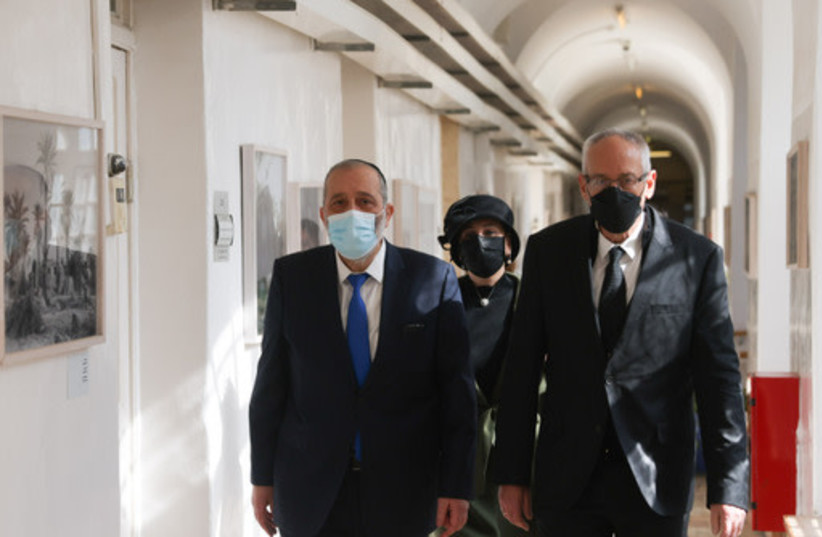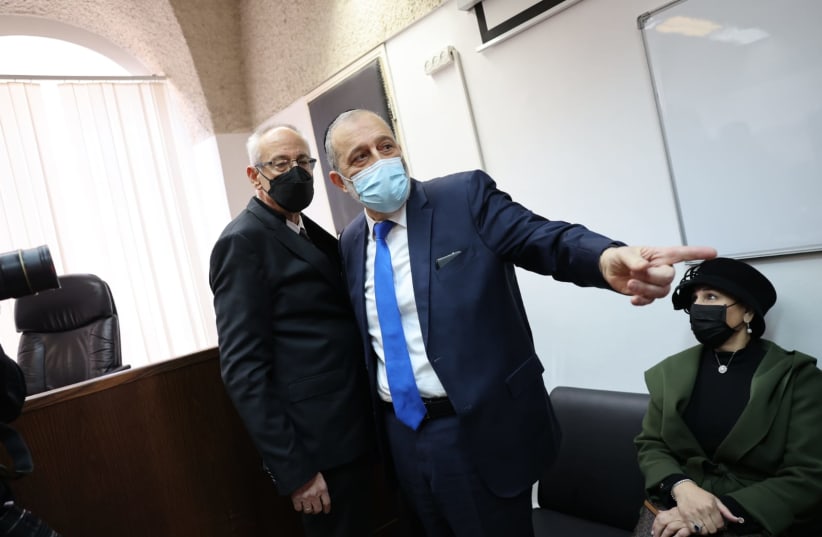The Jerusalem Magistrate’s Court on Tuesday convicted Shas Party leader Arye Deri of minor tax crimes. It will weigh a request to fine him NIS 180,000 as part of a plea deal that saw him resign from the Knesset this past Sunday.
The court will make its final sentencing decision on February 1. Though technically the court could order a stiffer or more lenient sentence, judges usually defer to the terms of a plea bargain.
Anti-corruption groups criticized the deal on charges dating back to 2013 as too lenient in that it has allowed Deri to retain control of the Shas Party, return to the next Knesset and possibly even to someday return as a minister despite this being his second corruption conviction.
In a somewhat anti-climactic moment, Deri stood before the Jerusalem Magistrate’s Court President Shmuel Herbst and confessed to the amended indictment, while answering several questions.
He said, “I accept full responsibility... no one forced me.” Deri emphasized that he respected the police and the prosecution through the process that lasted several years and included many lies against him which are not part of the conviction.

“I have left the Knesset and leave the mission which they granted me.... I struggled with that decision a lot,” he said.
Deri repeatedly bowed to the judge as he spoke, but knowing that he is unlikely to go to jail or be expelled from politics, he seemed completely free of stress.
Prosecutor Yaron Golomb told the court that there were several grounds for the lenient sentence, including Deri has resigned from the Knesset, saving the prosecution and country a messy trial; the approximate two decades between Deri’s two convictions; his limited involvement in the current lawbreaking; the absence of a pattern of tax avoidance; the small number of funds in play; and the lack of serious long-term criminal intent.
In addition, Deri defense lawyer Navot Tel Tzur added that Deri had suffered for several years through an extensive and long corruption probe and that the High Court of Justice had effectively already approved the deal.
When groups attacked the deal before the High Court of Justice prior to Tuesday’s hearing before the Magistrate’s Court, the High Court on January 17 rejected a petition to cancel the plea deal, telling the petitioners it was premature to decide the issue of moral turpitude and leaving open his potential path to return to the Knesset.
The court’s ruling did mean that it could still potentially block him from becoming a minister in the future, however, the justices did not want to decide the issue before it was concretely on the table.
The current government technically has around four more years left to its term, and in any event, there are no elections in which Deri could seek a new office in the near future.
On December 29, The Movement for the Quality of Government in Israel petitioned Justices Yitzhak Amit, Noam Sohlberg and Alex Stein to effectively block Deri from holding future public office.
According to the NGO, Deri’s crimes in this instance and his status as a repeat offender following a prior multi-year jail sentence should lead to a finding of moral turpitude that would bar him from office for another seven years – essentially ending his political career.
Deri was previously convicted and sent to jail for multiple years and barred from politics for nearly 10 years. At that point, however, he was in his 40s, whereas now he is already 62, so a seven-year ban at this point would be far more significant.
In February 2021, Mandelblit held a pre-indictment hearing for Deri on three counts of tax fraud potentially totaling more than NIS 1.5 million.
On January 9, 2021, Mandelblit announced his likely intent to charge Deri, though he also dropped the most serious charges of bribery that the police had probed.
In the first of the three counts of tax fraud in the Justice Ministry January 9 statement, Deri sold real estate in Givat Shaul to his brother Shlomo Deri in order to perpetrate tax evasion.
The price of the sale, documents relating to reporting taxes on the sale, and characterizing the real estate as empty when it was a residence were all done with fraudulent purposes.
In the second count of fraud, Deri was paid for his investment activities by the company Green Oshen dating to 2011, when he was out of politics. He later directed the fund to make those payments to his brother Shlomo to avoid paying taxes.
From 2013 to 2015, Shlomo issued NIS 630,000 in fraudulent invoices for consulting activities that he had not provided, in order to cover up the tax evasion.
A third count of tax fraud was dropped from the charges.
The Justice Ministry statement in January 2021 emphasized that Deri had the intent to defraud the tax authorities and that this was not a simple case of a civil misunderstanding that would result in a mere fine.
In August 2019, former state attorney Shai Nitzan recommended indicting Deri for tax crimes, fraud, money laundering and some unspecified obstruction crimes.
After a nearly three-year probe, the police had recommended indicting then-interior minister Deri in November 2018.
The delay in indicting Deri since 2018 was highly unusual, but Mandelblit claimed that most of the charges from 2018 did not pan out and some of the charges in the conviction were only fully discovered much later.
